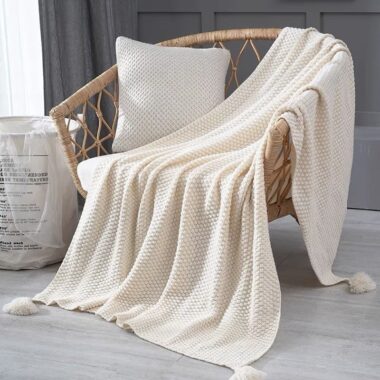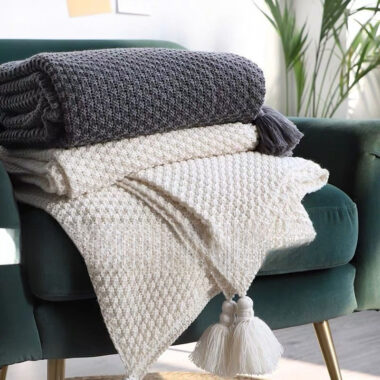When it comes to sourcing blankets in bulk, selecting the right supplier is one of the most important decisions a buyer can make. The supplier you choose will determine the quality of the products, the stability of the delivery schedule, and even the profitability of your business. While cost is always a major factor, experienced buyers understand that the cheapest supplier is not necessarily the best one. Instead, the goal should be to find a blanket supplier or factory that combines quality, efficiency, and flexibility in a way that supports your long-term growth.
👉 1. Understanding Factory Capabilities
The first step in choosing a blanket supplier is to determine whether they are a trading company or a factory. A supplier with its own blanket factory often provides more consistent production capacity and better quality control. Buyers should ask about the number of production lines, the type of machines used, and the monthly output capacity. For example, a factory with advanced knitting or weaving machines can produce blankets more efficiently and ensure shorter lead times for bulk orders. Visiting the facility, either physically or virtually, can help confirm these details and give buyers more confidence in the supplier’s capability.
👉 2. Evaluating Materials and Product Quality
Blankets are available in a wide range of materials, including fleece, wool, mink, polyester, and acrylic. Each material has its own advantages—fleece is lightweight and versatile, wool is warm and natural, and mink-style fabrics are thick and luxurious. A reliable blanket supplier will provide clear details about fabric composition, GSM weight, and finishing methods. It is wise to request physical samples before placing an order. Samples allow buyers to check softness, durability, stitching, and colorfastness. Consistent quality across different batches is a hallmark of a professional blanket factory and should be a key factor in your decision-making process.
👉 3. Customization Options for Different Markets
In today’s global market, standard products are often not enough to attract attention. Buyers frequently require custom blankets tailored to their branding and regional preferences. Customization can include special sizes, unique colors, digital printing, embroidery, edging styles, and even custom labels or retail packaging. A strong supplier will work closely with clients to develop private-label blankets or promotional designs that stand out. For example, a hotel chain may need custom embroidered blankets for brand identity, while a retail store may prefer bold printed designs. Working with a supplier that understands customization ensures that your blankets meet both functional and marketing requirements.
👉 4. Pricing, Value, and Payment Flexibility
Price is always one of the most sensitive topics in wholesale purchasing. However, focusing only on the lowest cost can be a mistake. Buyers should consider what is included in the price: Is the fabric high-quality? Is the stitching strong? Are packaging and labels part of the deal? Transparent pricing from a blanket supplier builds trust and reduces misunderstandings later in the process. In addition, payment flexibility is worth considering. Some factories may accept staggered deposits, bank transfers, or even letters of credit for large orders. The ability to negotiate fair payment terms can make a partnership more sustainable in the long run.
👉 5. Delivery Time and Logistics Support
Timely delivery is another critical factor when choosing a blanket factory. Wholesale buyers often face strict deadlines for retail seasons, hotel projects, or promotional campaigns. A trustworthy supplier should provide clear lead times and realistic schedules. Standard production may take 25–35 days after sample approval, but urgent orders may require faster handling. Buyers should also ask about shipping arrangements, whether by sea, air, or courier. Suppliers experienced in international trade will assist with export paperwork, customs clearance, and freight booking. This logistical support ensures that blankets arrive on time and reduces risks of costly delays.
👉 6. Certifications and Compliance Standards
For buyers in Europe, North America, and other regulated markets, certifications are increasingly important. Reputable blanket suppliers can provide testing reports and certifications such as OEKO-TEX, SGS, or ISO compliance. These certifications prove that the blankets are safe, free from harmful chemicals, and meet international standards. Compliance is not just a legal requirement—it also adds value to the final product. Retailers and institutions are more likely to buy from you if you can show that your supplier’s products meet strict quality and safety standards.
👉 7. Communication and After-Sales Service
Another factor that is sometimes overlooked is communication. A blanket supplier that responds quickly, answers questions clearly, and provides regular updates is often more reliable. Good communication helps avoid mistakes in specifications, shipping, and payment details. After-sales service is equally important. If there are issues with a shipment—such as defects, missing cartons, or delays—a professional factory will work with the buyer to resolve them efficiently. This builds trust and makes it easier to maintain long-term cooperation.
👉 8. Building Long-Term Partnerships
The ultimate goal of selecting the right blanket supplier is not just one order but a lasting partnership. Buyers who work closely with a reliable factory can enjoy stable pricing, priority production, and better support for new product development. In return, the factory benefits from steady business and long-term growth. Both sides win when the relationship is built on trust, transparency, and mutual benefit.
🔑 Conclusion
Choosing the right blanket supplier for bulk orders involves more than comparing price lists. Buyers must carefully assess factory capabilities, materials, customization options, pricing transparency, delivery reliability, and compliance standards. Strong communication and professional after-sales service are also essential. By partnering with a trusted blanket factory, global buyers can secure consistent quality, reduce risks, and expand their markets with confidence.








